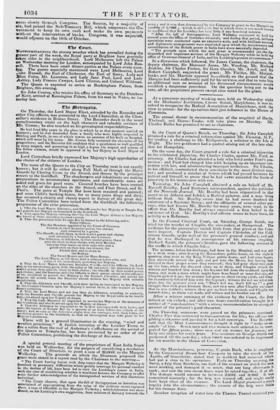In the Court of Queen's Bench, on Thursday; Sir John
Campbell obtained a rule for a criminal information against 3Ir. Fleming, 'ALP, for sending a challenge to Mr. Kirkpatrick, a solicitor in the Isle of Wight. The two gentlemen had a quarrel arising out of the late elec- tion for Hampshire.
On the same day, the Court granted a rule for a criminal injunction to the celebrated physician, Sir Charles Clarke, against Mr. Ford, an attorney. Sir Charles had attended a lady who lived under Ford's pro- tection: and Ford had charged him with keeping up an improper con. nexion with her, and administering improper medicines. Sir Charles, in his affidavit, contradicted these assertions in the most distinct man. ner; and produced a number of letters which had passed between his patient and himself, to prove that he had never exceeded the limits of propriety in his interceurse with tier.
Yesterday, Sir John Campbell obtained a rule on behalf of Mr.
Russell Bowlbv, Lord Durham's correspondent, against the publisher of the Newcastle Journal, Mr. Bowlby had been stigmatized in that paper as an Atheist and Infidel, a Radical agitator, and a man living without God. Mr. Bowlby swore that he had never doubted the existence of a Supreme Being; and the affidavits of several other per- sons, who had known Mr. Bowlby for many years, were read, to the effect that Mr. Bowlby had always expressed a firm belief in the existence of God. Mr. Bowlby's real offence seems to have been, his activity as a Reformer.
In the Central Criminal Court, on Saturday, George Smith, was tried tor the murder of Chaplin, the shoemaker, at Hampstead. The evidence for the prosectitiou railed little from that given at the Cora ner's inquest. Captain Horton and Captain Chisholtn, of the Cold. stream Guards, spoke well of the prisoner's general conduct, and said that he WPS discharged in consequence of his extreme stupidity. Richard Smith, the prisoner's brother, gave the following account of the scuffle in which Chaplin fell— The prisoner, before his discharge, had been in the Hospital, anti was still in a weak state ; after leaving the Horse-shoes public-house on the nightie question, they vreut to the King William puldic•house, awl 'hail some liquor; they afterwards missed the path awl got into the Mews, but having been directed in their proper course they returned ; they had gone shout two yards up tie lane, when the deceased came up to them, and Chaplin struck the witness and knocked him down ; his ba■ onet fell from the scabbard upon that stones, and made a noise which might have been heard at some distance, and Chaplin picked it up; the pi isuner had gone on about twenty jards, and Chap- lin immediately followed him with the hakonet ; witness did not see what took place, hut the prisuner cried out, " Don t kill me, don't kill me !" a great struggle then took place between then., awl very soon after Chaplin exclaimed that lie was stabbed ; witness then got up h the ground, and Chaplin ran towards him ; an alai in was made, and witness and his brother ran Of.
After a minute summary of' the evidence by the Court, the Jury retired at six o'clock ; and after two hours consideration brought in a verdict of " manslaughter," with a strut% recommendation to trierey,on account of the prisoner's good character.
On Thursday, sentences were passed on the prisoners convicted. Charles Parr was sentenced to transportation for late; his offeeca was gilding at sixpence and passing it to' ii half.sovereign. The Recorder said that the Mint Commissioners thought it right to " make an ex- ample "of him. Seven men and two women were ordered to he trans- ported for fifteen years ; three men and six women for Aar/elm; and forty one other s for seven years Tile sentence on George Smith was postponed till the next day ; alien smirh was ordered to be imprisoned for six months in the House of Correction.


























 Previous page
Previous page